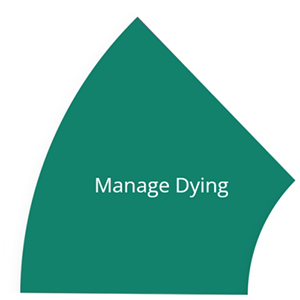 Manage Dying
Manage Dying
Managing dying involves:
- recognising the signs of approaching death
- focusing on comfort
- following legal procedures, and
- supporting both the dying person and their family.
During this time, it is important to focus on keeping the person comfortable and maintaining their dignity.
What to look out for
-
Final days of life
-
Final hours to days of life
-
Dementia and dying
There are common signs to look out for when someone is in their final days of life. These include:
- rapid decline in health
- needing more frequent help
- becoming semi-conscious or unconscious
- difficulty swallowing
- refusing food, drinks, or medicine
- changes in breathing patterns.
In the final hours to days of life, several specific signs may appear, such as:
- changes in breathing
- drowsiness
- restlessness
- reduced urine output.
- Common causes of death for people with dementia include pneumonia, cardiovascular disease, and sudden unexplained deaths.
- Recognising when someone with advanced dementia is dying can be difficult.
- If common issues such as difficulty swallowing or refusing food get much worse over a few weeks or days, it might mean the person is dying.
Ensuring good end-of-life care
Good end-of-life care meets the person's physical, psychological, spiritual, and social needs. Managing symptoms like pain, anxiety, nausea, and breathing problems is important to help the person remain comfortable. Tools like the Symptom Assessment Scale (173kb Word) can help identify and manage symptoms. Some long-term treatments that do not help with comfort (such as some blood pressure medicines) may be stopped.
In residential aged care, services may commence an end of life care pathway (1MB pdf). This will help ensure comprehensive care for the person at the end of life. The goal is to ensure a 'good death' with dignity, pain relief, and respect for the person's wishes about where and how they die.
After the person has died
After death, practical tasks need to be done. These include verifying the death, completing legal paperwork, and supporting the family. Usually, a nurse or doctor will declare the person dead, and a general practitioner (GP) will certify the death. Sometimes, deaths need to be reported to a coroner.
Care of the body after death usually involves nursing staff or undertakers. They may wash and dress the body. Speak with families to see if they have any requests. Every family should have the time they need with the person’s body.